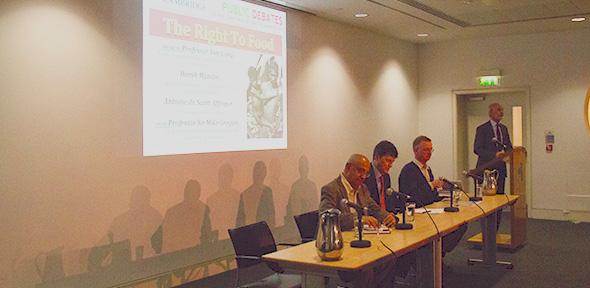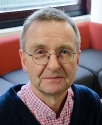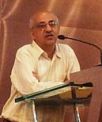
Third debate took place on 8 April 2013 at Kings Place, London
The Right to Food
The final debate in the series aimed to examine the ways in which state action, public distribution systems, food networks and private supply chains can secure the right to food security.
Themes discussed at this debate:
- Does the primary responsibility for guaranteeing basic entitlements as well as food and livelihood security rest with the state?
- What is the role of public distribution systems in providing food security in the 21st century, in the face of pressures for more liberalised economic policies?
- Can private sector food supply chains be harnessed to provide affordable and nutritious food to those who are most vulnerable?
- How can the right to be free from hunger and malnutrition be implemented and realised?
Chair: |
Following an early career in industry he was the founder member of the team which established the Manufacturing Engineering Tripos, a senior undergraduate programme covering, marketing, design, production, distribution and service with very close industrial engagement. Subsequent developments in research and collaboration with industry reflected this broad view of manufacturing and led to the establishment of the IfM in 1998. Linking science, engineering, management and economics and integrating education, research and practice the IfM now has over 230 staff and research students and a further 100 undergraduate and Masters students. |
||
|---|---|---|---|
Speakers: |
|
||
|
|
|
Antoine de Saint-Affrique was appointed President of Unilever’s Food category in September 2011. Unilever Foods is a €14 billion business, with worldwide presence through iconic brands such as Knorr, Hellmann’s, Amora, Maille, Fruit d’or, Maizena. Prior to this, Antoine was Executive Vice President of Unilever’s Skin category – an area of the business which includes leading brands such as Dove, Lux, Lifebuoy and Pond’s. From early 2005 to mid 2009, Antoine was Executive Vice President for Unilever’s Central and Eastern Europe region – an area covering 21 countries. He was based in Moscow. Antoine has a degree from ESSEC (87) in Paris, and a qualification in executive education from Harvard Business School. Since 2004, he has led the marketing course at Mines ParisTech (Corps des Mines). A French national, Antoine has lived in Africa, the US, Hungary, the Netherlands and Russia, and is now based in the UK. He is a Non-Executive Director and a member of the audit committee at ophthalmic company Essilor International, the world leader in corrective lenses. He is also Conseiller du Commerce Extérieur since 2004. Antoine is married, with four children. |
|
|
|
|||
|
|
Tim Lang has been Professor of Food Policy at City University London’s Centre for Food Policy since 2002. After a PhD in social psychology at Leeds University, he became a hill farmer in the 1970s which shifted his attention to food policy, where it has been ever since. For over 35 years, he’s engaged in academic and public research and debate about its direction, locally to globally. His abiding interest is how policy addresses the environment, health, social justice, and citizens. Tim has been a consultant to the World Health Organisation (eg auditing the Global Top 25 Food Companies on food and health), a special advisor to four House of Commons Select Committee inquiries (food standards x 2, globalisation and obesity) and a consultant on food security to the Royal Institute of International Affairs (Chatham House). He was a Commissioner on the UK Government’s Sustainable Development Commission (2006-11), reviewing progress on food sustainability. He was on the Council of Food Policy Advisors to the Dept for Environment, Food & Rural Affairs (2008-10), and was appointed to the Mayor of London’s Food Board in 2010. |
||
|
|
|||
|
|
|
Harsh Mander is a social worker and writer. He founded and works with Aman Biradari, a people’s campaign for secularism, peace and justice; Nyayagrah, for legal justice and reconciliation for the survivors of communal violence; and Dil Se, which works with street children, and homeless people. He is Special Commissioner to the Supreme Court of India to advise it in the Right to Food case on hunger and state responsibility, and Director of the Centre for Equity Studies (working on public policy for the poor). Harsh writes columns for the Hindu and Hindustan Times, and is Visiting Professor at IIM, Ahmedabad on poverty and governance. He worked formerly in the Indian Administrative Service in Madhya Pradesh and Chhatisgarh for almost two decades. He is associated with social causes and movements, such for communal harmony, tribal, dalit, and disability rights, the right to information, custodial justice, homeless people and bonded labour. He writes and speaks regularly on issues of social justice. His books include ‘Unheard Voices: Stories of Forgotten Lives’, ‘Fear and Forgiveness: The Aftermath of Massacre’ and ‘Ash in the Belly: India’s Unfinished Battle against Hunger’ published by Penguin India. Other major books include ‘The Ripped Chest: Public Policy and Poor in India’ and his co-authored ‘Untouchability in Rural India’. He was awarded the Rajiv Gandhi National Sadbhavana Award for peace work, and the M.A. Thomas National Human Rights Award 2002. |
|





